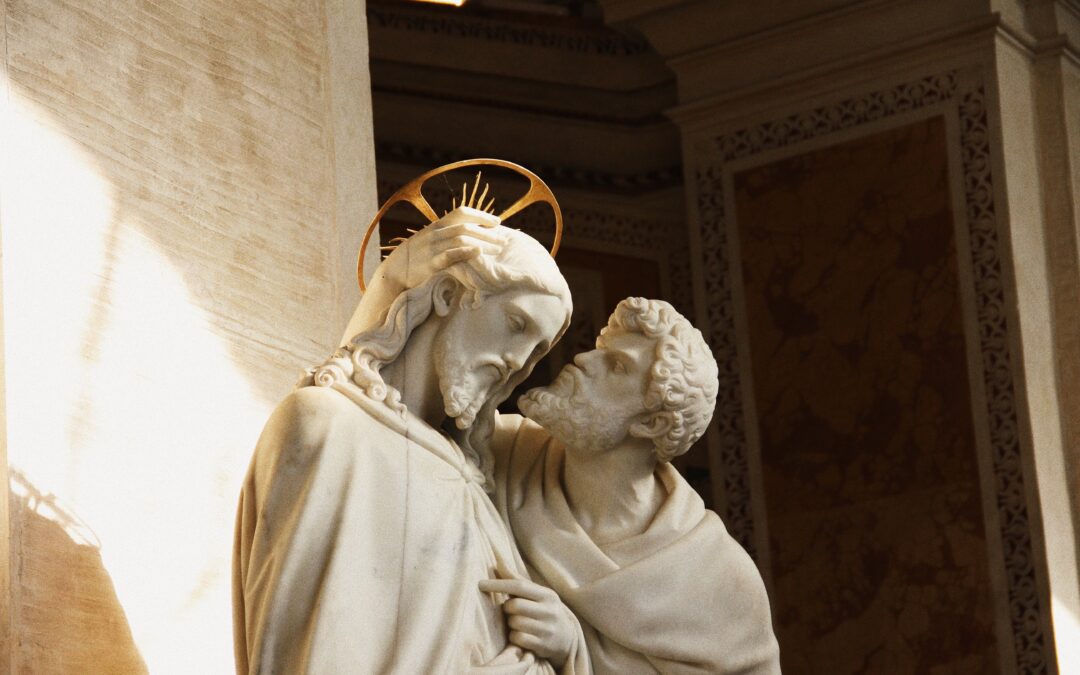Listen to Nancy’s answer recorded live on Moody radio, here:
Tim Hansel writes a humorous piece on how a job recruiter might see the potential of Jesus’ disciples. “It is the staff opinion that most of your nominees are lacking in background, education and vocational aptitude for the type of enterprise you are undertaking. They do not have the team concept. We would recommend that you continue your search for persons of experience in managerial ability and proven capability. Simon Peter is emotionally unstable and given to fits of temper. Andrew has absolutely no qualities of leadership. The two brothers, James and John, the sons of Zebedee, place personal interest above company loyalty. One of the candidates, however, shows great potential. He is a man of ability and resourcefulness, meets people well, has a keen business mind, and has contacts in high places. He is highly motivated, ambitious, and responsible. We recommend Judas Iscariot as your controller and right-hand man.” On paper, Judas looked far superior to the other disciples, but God looks on the heart, and Judas’ heart was beyond deceitfully evil.
To better understand why Jesus chose Judas Iscariot, we need to understand that God is never surprised. Jesus is the one true God, all knowing, and sovereign over everything that is and ever was and ever will be. Jesus knew exactly what Judas was thinking and what he would do. He knew the heart of Judas. He was a “devil,” a thief, an unbeliever, spiritually unclean and came off to all as being religious. Sadly, he fit the profile of millions of “religious” people in this world that Jesus came to save. God had given him a very important position in the family of disciples and never shut the door of salvation to him.
“Jesus answered them, “Did I not choose you, the twelve? And yet one of you is a devil.” He spoke of Judas the son of Simon Iscariot, for he, one of the twelve, was going to betray him” (John 6:70,71).
“He said this, not because he cared about the poor, but because he was a thief, and having charge of the moneybag he used to help himself to what was put into it” (John 12:6).
“But there are some of you who do not believe.” (For Jesus knew from the beginning who those were who did not believe, and who it was who would betray him)” (John 6:64).
Despite Judas’ deceitful and evil heart, God still loved him. He gave him every chance to repent. It appears that Judas had no idea of who God is nor the grace that he offers to all. He was typical of so many so-called “Christians” not only in the first century, but today as well. He was seen as being a religious man, he knew the word of God that was taught by God Himself, he witnessed miracles and performed his religious duties on the outside as he purported to be a kind and caring person. On the outside, he had it all. On the inside, he was possessed with greed that would soon lead him to a place of eternal torment called Hell.
“For such men are false apostles, deceitful workmen, disguising themselves as apostles of Christ. And no wonder, for even Satan disguises himself as an angel of light. So it is no surprise if his servants, also, disguise themselves as servants of righteousness. Their end will correspond to their deeds” (2 Corinthians 11:13-15).
In the end, God used Judas to fulfill HIs plan to sacrifice His own Son for the redemption of mankind. The death of Jesus was not an accident. It was prophesied in the Old and New Testament.
“Even my close friend in whom I trusted, who ate my bread, has lifted his heel against me” (Psalm 41:9).
“If you think good, give me my price … 30 pieces of silver” (Zechariah 11:12-13) Jesus was betrayed for thirty pieces of silver.
“The Son of Man goes as it is written of him, but woe to that man by whom the Son of Man is betrayed! It would have been better for that man if he had not been born” (Matthew 26:24).
“I am not speaking of all of you; I know whom I have chosen. But the Scripture will be fulfilled, ‘He who ate my bread has lifted his heel against me’ “ (John 13:18).
Our righteous God does not create evil, but He does use the brokenness of men to create good. God will never participate in sin, but, in His power and wisdom, God can and sometimes does use the sin to fulfill His purpose. Judas was chosen with God’s foreknowledge that he would betray Jesus, but his betrayal, rather than stop God’s plan for salvation, actually advanced it. In the middle of the chaos that Judas created, God was about to be glorified.
Judas always had a way out of his desire to betray Jesus. Judas and others who condemned and crucified Jesus were not without fault. Judas Iscariot bore the responsibility for what he chose to do. In the end, Judas Iscariot got what he deserved. He hung himself and then he faced judgement.
Jesus said, “The Son of Man will go just as it is written about him, but woe to that man who betrays the Son of Man! It would be better for him if he had not been born” (Mark 14:21).

